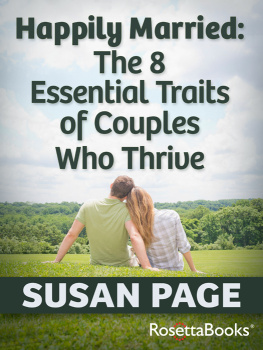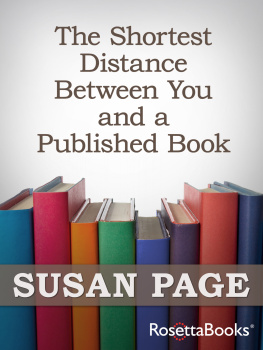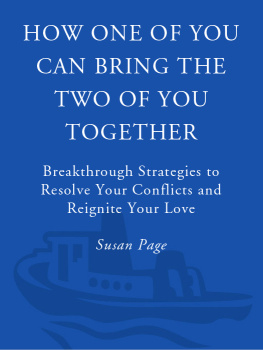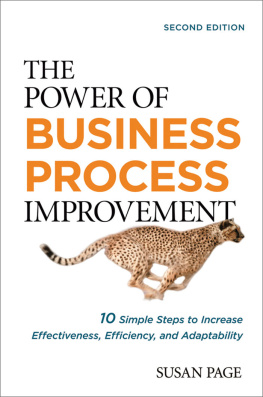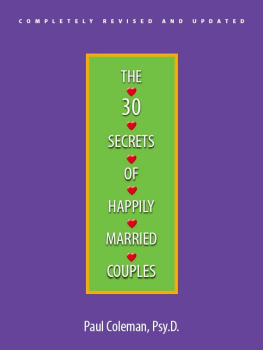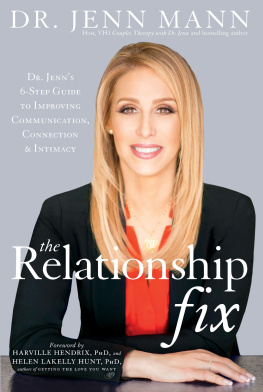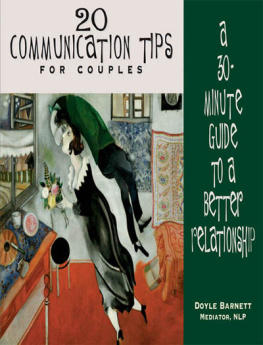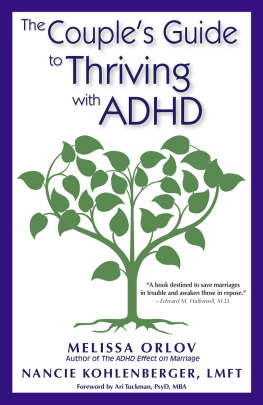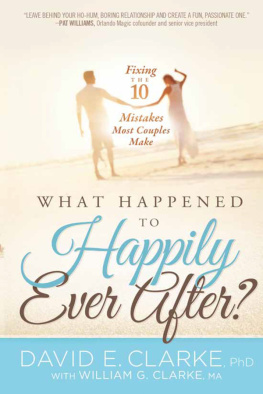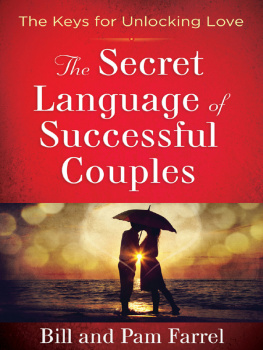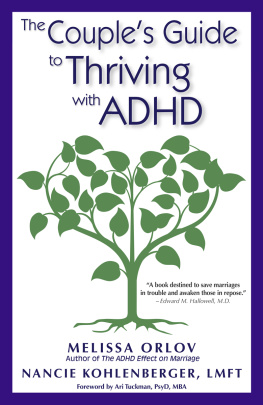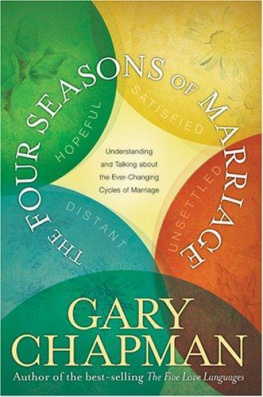Happily Married
The 8 Essential Traits of Couples Who Thrive
Susan Page
Copyright
Happily Married: The 8 Essential Traits of Couples Who Thrive
Copyright 2013 by Susan Page
Originally published as The 8 Essential Traits of Couples Who Thrive, copyright 1994 by Susan Page
Cover art, special contents, and Electronic Edition 2013 by RosettaBooks LLC
All rights reserved. No part of this book may be used or reproduced in any form or by any electronic or mechanical means, including information storage and retrieval systems, without permission in writing from the publisher, except by a reviewer who may quote brief passages in a review.
Cover jacket design by Alexia Garaventa
ISBN e-Pub edition: 9780795334399
For Mayer
From studies of various age and population groups in the United States and abroad, [psychologists] have reached some objective conclusions on the makings of happiness. What comes up consistently at the top of the charts is not, as many might expect, success, youth, good looks or any of those enviable assets. The clear winner is relationships. Close ones. Followed by happy marriage.
Newsweek, May 24, 1993
Preface
The seed for this book was planted in my mind when the hundredth person approached me after I published my first book to declare, Susan, I have the perfect title for your next book: If Im So Wonderful, Why Am I Still Married? Ha, ha, ha!
I chuckled to be polite, but inside I didnt understand why this was supposed to be funny. After hearing it dozens of times, I began to feel downright sad. I wanted to say to these people, If you arent happy with your marriage, why dont you do something about it?
I began to search the literature for books about happy marriagebut they all turned out to be about how to drag your awful relationship up out of the gutter and make it tolerable. The more I read and the more gallows humor I heard, the more determined I became to tell the world that I was extremely happy with my husband, and that I thought people were making attaining a happy marriage more complicated than it needed to be.
At first I began to tell the story of Mayer and me and all that we have learned in our eventful twelve years together. But I didnt want negative thinkers to dismiss us as an aberration. And I kept writing things like, and this isnt unusual. Our friends Bob and Jeanne had a similar experience. When I began sharing my ideas with Bob and Jeanne and others, we had such an exciting time talking about our relationships that I quickly realized I had much to learn from other thriving couples. And when I set about finding happy couples to interview, I was faced with an avalanche.
The major points in this book are also the result of my more than twenty years of professional involvement with couples. In 1970, when my colleague Roseann Packard and I founded one of the nations first university-based human sexuality programs, at the University of California in Berkeley, I learned from the young couples I counseled the importance of letting go of preconceived ideas about how sex ought to be and of accepting what it actually was for them. And I quickly saw that letting go of preconceived ideas about how relationships and life in general should be was an important basic prescription for a good life and a sense of well-being.
In my work as Protestant campus minister and as the director of a domestic violence prevention agency, I continued to gain experience and insights about the way some couples resign themselves to a lackluster marriage. It was the sense that I had an unusual view of relationships that led me to begin my workshops in 1980.
All of my work was supported by extensive training in Gestalt psychology and Bioenergetic therapy. As I explained in my first book,
The theory behind Gestalt (a German word meaning, roughly, whole) is that through the process of ordinary living, most individuals become fragmented; that is, they become alienated from certain aspects of themselves. For example, a woman who grew up in a family where anger was severely punished and politeness was maintained at all costs may be completely unaware of her buried anger. Or, a man who was taught never to cry and always to maintain an in-control attitude may be altogether unconscious of his soft, vulnerable feelings. Using a variety of techniques, Gestalt, which was developed by Fritz Perls, assists individuals to reclaim lost aspects of themselves and, thereby, to become more integrated, more whole, and more fully functioning human beings.
Much of what I learned in my workshops over the years is presented in the pages that follow. I have also drawn heavily on the experiences of the thirty-two happy couples I interviewed in depth as well as my own odyssey from an eight-year first marriage, through a painful but ultimately enlightening divorce, six years of singlehood, and now twelve years of experiencing lifes joys and challenges together with my wonderful husband.
***
Mayer and I met when we were both thirty-seven. Both of us had been married before and were looking, deliberately and systematically, for new marriage partners. When I met Mayer, I dismissed him as a nice guy, but not at all my type. I was in the market for a university professor or minister or politician, someone who had a Ph.D. and lots of public recognition. When Mayer told me he was a studio potter, I thought it was a polite way of saying that he was a hippie dropout who made mugs in his garage and sold them at flea markets. I had three two-hour dates with him (lunch, breakfast, or coffee), for I had a policy of holding off on evening dates with a person until I felt the relationship was something I might want to pursue. Our fourth date was for breakfast, but it lasted all the way to dinner and beyond, and we have rarely been apart since.
I soon learned that there really is such a thing as a career studio potter. Mayer had been making his living as one for twenty years and was quite well known. He opened up an exciting new world to me of decorative and craft arts.
We faced several challenges early on. To begin with both of us were in career transition when we met. I had just left a position as the executive director of a child-abuse prevention agency in order to give more attention to my relationship workshops and my writing. Mayer was determined to move away from functional pottery so he could work full-time creating ceramic art. We encouraged each other to pursue our true desires, even though this meant that our financial situation was unstable, causing us periods of real anxiety.
Mayers son, Gabe, who lived with Mayer full-time, was eleven when they adopted me. I was thrilled to be a part of this sweet boys life, but was naive about how hard it might be for Gabe to accept me, uninvited competition for his dads attention. Because I believe strongly in the value of professional help in matters like these, we went into family therapy almost as soon as we got married. It was enormously helpful. For example, Mayer felt torn between his loyalties to Gabe and to me, and didnt know how to handle Gabes attempts to exclude me. The therapist made it clear to us that what Gabe needed most was limits and consistent messages, and that Mayer had to make it absolutely clear to Gabe that I was now part of the picture. For my part, it was difficult for me not to take Gabes rejection personally. I had to be reassured over and over that the problem wasnt me. I could be a fairy godmother and still be seen by Gabe as unwelcome. Both of these were insights we would not have seen so clearly if we had tried to chart a course without help.

